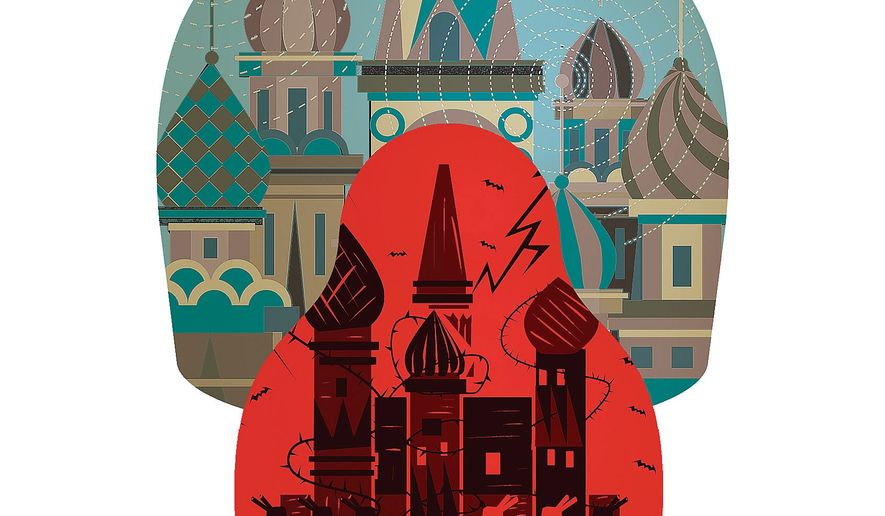OPINION:
We seem prepared to believe any evil of Vladimir Putin’s Russia, which has with its second-rate military establishment and failing economy somehow morphed in the minds of many Americans into a greater threat than the old Soviet Union.
Hillary Clinton and John Podesta are convinced Mr. Putin cost her the White House and that President-elect Donald Trump might as well be working for the Kremlin. The CIA tells us that Russian-sponsored hackers are responsible for all manner of sins and did, in fact, hack into Democratic National Committee emails even while being rebuffed by security measures in place at the Republican National Committee.
President Obama doesn’t like Mr. Putin, although it’s unclear whether he has him above or below Israel’s prime minister on his personal enemies list. His retaliation against Russia for its “interference” in last November’s elections was welcomed by his allies in the media and by senators like Arizona’s John McCain and his South Carolina sidekick Lindsey Graham as a good start. All seem fearful that a President Trump, upon being sworn in later this month, might actually try to ease tensions they want increased.
In this drive to further demonize Mr. Putin’s Russia, they will apparently believe anything and have become the nation’s No. 1 spreader of that hated “fake news.” When Mr. Obama tossed a number of Russians out of the country to retaliate for Russian hacking, CNN excitedly announced that the Russian government had closed an exclusive, private Anglo-American school in Moscow, a story picked up by dozens of other news outlets and rebroadcast by our government’s Radio Free Europe. The source, according to CNN, was a “U.S. government official,” but the story was pure bunkum.
A few days later, another major story made the rounds, alleging that the Russians had “hacked” into the U.S. power grid in Vermont and could wreak real havoc on the national grid as a result. Turns out that story, too, was false. Intelligence experts around the world jumped all over the reports and it was later learned that while there was a smidgen of evidence that someone had at some time tried to hack a laptop owned by an employee of the Vermont utility, the utility and the grid were not hacked.
It’s time for everyone to chill as, to his credit, Mr. Putin seems to be doing. Early threats from the Russian Foreign Ministry that Russia was going to retaliate by throwing out U.S. diplomatic employees on a “tit-for-tat” basis and close a U.S. government-owned property in Moscow were apparently countermanded by Mr. Putin himself, who seems for his own reasons ready to ease rather than increase tension with the United States.
Mr. Putin is no Thomas Jefferson. He is an internally popular Russian nationalist who runs what is, by U.S. standards, a crony capitalist autocracy and has acted internationally in ways that deserve condemnation, but he is neither Hitler nor Stalin.
As much as some in Washington like to compare today’s Russia with the old Soviet Union, the two are very, very different. Mr. Putin may be a modern-day Russian czar, but he does not head a regime wedded to an ideology bent upon dominating and transforming the world into its own image. It was the quasi-religious belief of Soviet ideologues that the Communist utopia they sought could not be completed until they controlled all the world’s people that made the Soviet Union an existential threat to the rest of us.
We may not like Mr. Putin or his government, but as former Czech President Vaclav Klaus put it during a recent visit to Washington, a nation and its leaders may be detestable without being dangerous. Mr. Putin’s Russia is a real and present danger to Ukraine and is a potential threat to others on Russia’s border who have perhaps less to worry about now than they did when Russia was Communist, but as much as during the pre-Soviet era. Many of these countries deserve our support, but it would be a mistake to conclude that Moscow’s historically typical meddling in its own neighborhood makes it as great a threat to us and our interests as the old Soviet Union.
Still, many in the West seem to long for the bipolar world that existed before the collapse of the Soviet Empire. Everyone knew their enemy and played by a set of harsh, but knowable rules. The nuclear face off that used to scare everyone seems stable in light of what’s happened since, and even the most brutal of the old Soviet dictators seem positively rational next to the folks we have to deal with in the Middle East and elsewhere these days.
That, however, is not the world we find ourselves in today. There are new monsters out there and we need to focus on the threats they pose rather than wishing for the return of those already slain.
• David A. Keene is opinion editor of The Washington Times.




Please read our comment policy before commenting.